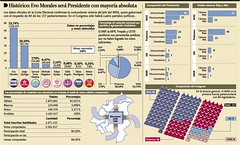Final election results in
01.04.2006Technorati tag: Bolivia
The final, official National Electoral Court results of are finally in, and there's a few minor surprises. While early returns had some of the minor parties winning a few seats in the lower house, that didn't happen. Instead, only four parties are represented in parliament: MAS, PODEMOS, UN, and MNR.

![]() In the lower chamber (House of Deputies), Evo Morales' MAS does, in fact, have a comfortable majority, w/
In the lower chamber (House of Deputies), Evo Morales' MAS does, in fact, have a comfortable majority, w/ 77 72 of 130 seats (or 59% 55% of the seats). That's a rather comfortable margin over the opposition: 38 42 seats for PODEMOS, 8 seats for UN, and 7 seats for the MNR. (Until I saw the final, official list, I thought MAS was short of a majority by one or two seats, mainly because I thought several minor parties had won some seats, which are now clearly MAS seats.)
Interestingly, the vast majority of the MAS deputies were elected from "uninominal" single-seat districts (SSDs). A little over half of the legislature (70 seats) is elected from such district contests, where the candidate w/ the most votes (not necessarily a majority, just more votes than anyone else) wins the seat. 50 45 of the 77 72 MAS seats are from SSD contests. Theoretically, these deputies are more closely linked to their district (w/ incentives to keep their constituents happy), than to their party.
It should also be noted that MAS didn't win a single SSD contest in Beni or Pando, and only one in Tarija. On the other extreme, it swept all 15 of the La Paz SSDs, and all but one of Cochabamba's 10 SSDs.
Also, while the MNR is clearly at its lowest historical point, it still managed to win 7 seats, sending back the firebrand deputy from Santa Cruz, Roxana Sandoval, as well as a few other veterans. The MNR's presidential candidate, Michiaki Nagatani, is also an elected "plurinominal" (not elected from SSD, but rather from the compensatory seats) representative from Santa Cruz. So he's likely to stay in the political limelight for some time to come.
In the upper chamber (the Senate), MAS doesn't have a majority, w/ only 12 of 27 seats (or 44% of the seats). In contrast, PODEMOS captured 13 seats; UN & the MNR each won a single seat. This means that the senate is currently dominated by the opposition.
I say "currently", because Evo Morales has launched negotiations w/ the MNR & UN to form a sort of coalition government (or at least some sort of partnership) that would give the new president a majority in the senate (12+1+1=14). This would be quite a coup for both the MNR & UN, since they'd have disproportionate power w/in any such coalition (since their single seats are the difference in an up or down votes in the senate). But is an MNR-Evo reconciliation even possible? We'll know in a few weeks.
Of special interest regarding party systems: This is the smallest number of parties (either total parties or "effective number of parties") in any post-democratization Bolivian legislature. In fact, it's awfully close to a two-party system (a "number of effective parties" value of 2.2).
----
CORRECTION: I miscounted the seats in favor of MAS during the original posting, please note the corrections. The error was completely mine, I was using CNE figures (before the Bolivian papers posted them) & simply miscounted them. Also, I forgot to mention that MAS only has a slim majority in the lower house; constitutionally, certain kinds of laws require a special two-thirds majority (which would require UN & MNR deputies to side w/ MAS).
Posted by Miguel at 01:38 PM
Comments
According ot la Razon, MAS got only 72 seats in the lower chamber (55%) and Podemos 43 (33%): MAS got 45 SSD and 27 Plurinominales and Podemos 22 SSD and 21 Pluris.
Posted by: ARN at January 5, 2006 05:34 AM